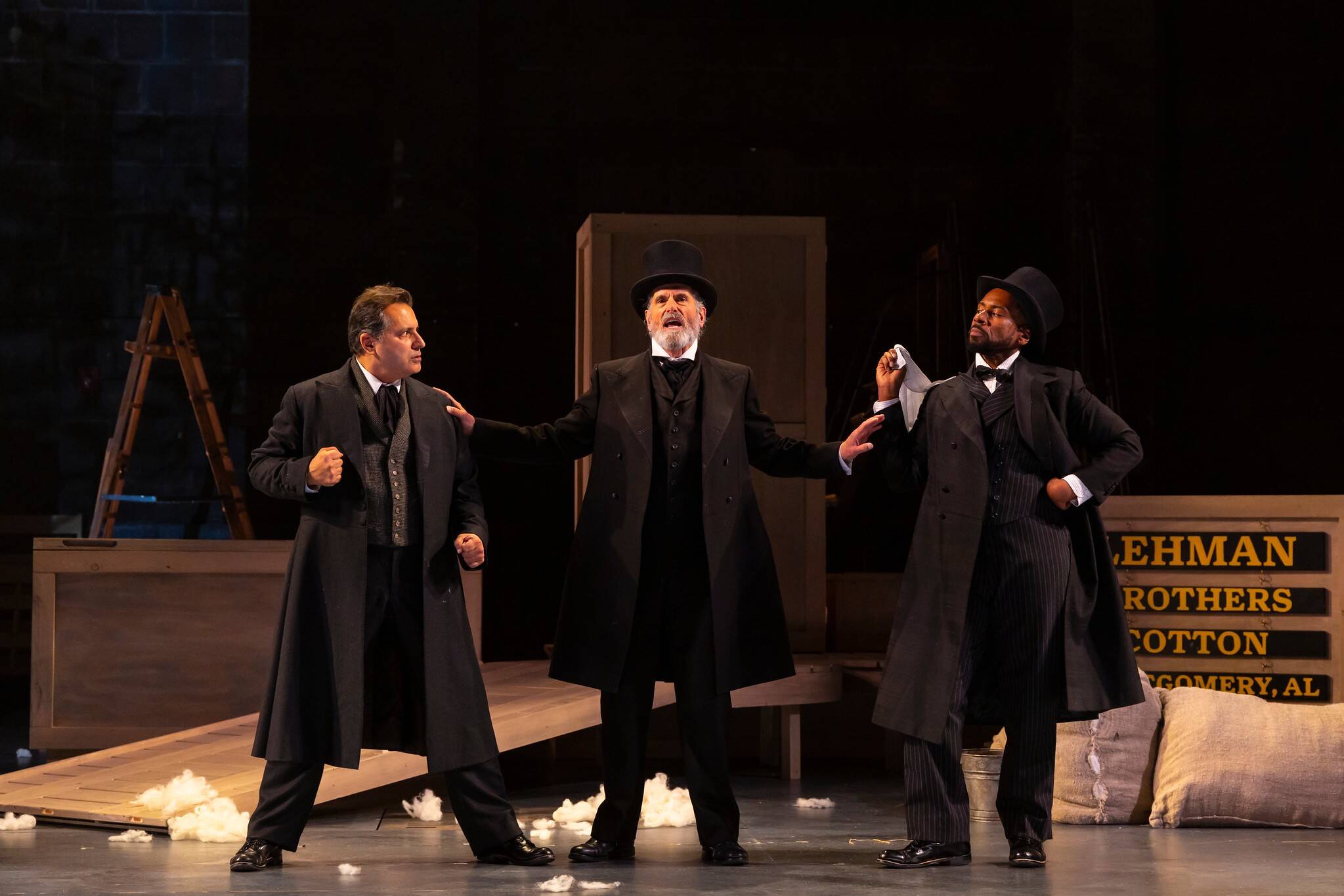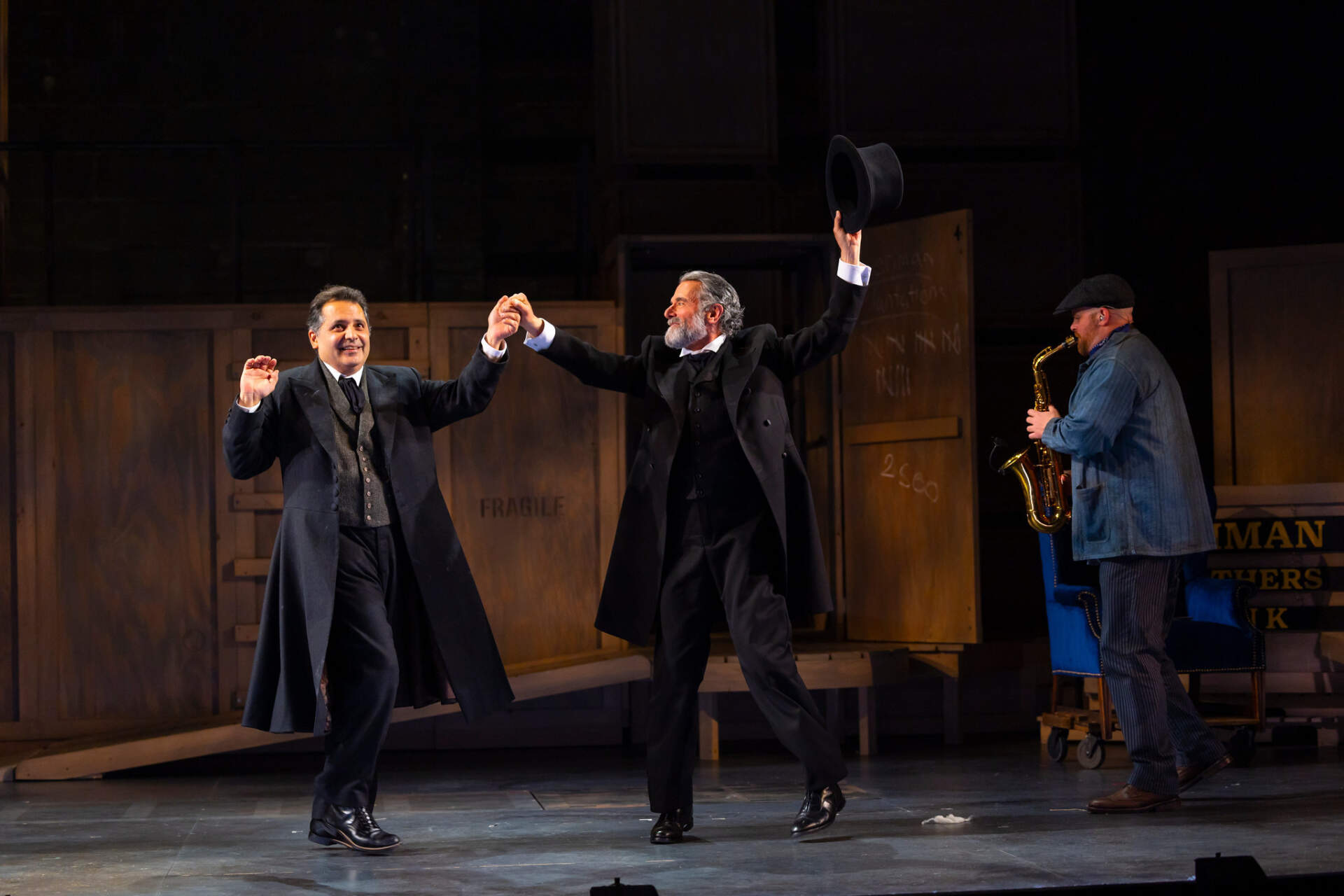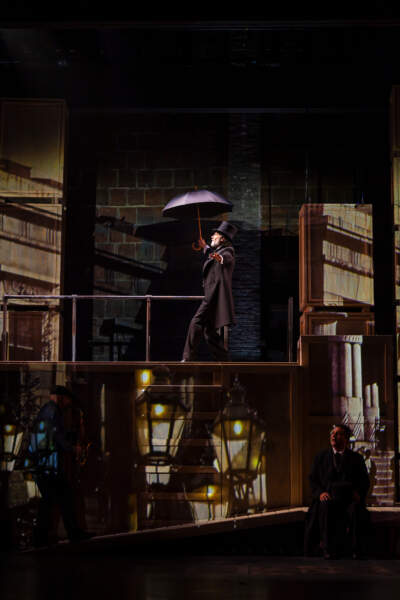Advertisement
REVIEW
A provocative 'The Lehman Trilogy' at the Huntington — amassing a fortune, but at what price?

Tales centered around the quest for power and money spark intrigue in the hearts of many. Especially if those on the fabled journey toward the American Dream come from poor or modest backgrounds, its attraction lies in the anyone-can-make-it-here lore. Perhaps that’s why “The Lehman Trilogy,” a play focused on three Jewish siblings who come to the U.S. on different boats at different times and become one of the wealthiest, most influential families in the country is so thrilling.
The Tony-winning play, written by Stefano Massini and staged on the Huntington Theatre Company mainstage (through July 23) is superbly rendered by Steven Skybell, Joshua David Robinson and Firdous Bamji. Particularly affecting is Skybell as the oldest Lehman, who goes by Henry after an immigration officer can’t pronounce his name. Skybell (and the other actors) portrays a dizzying array of characters, one of whom, Ruth—an outspoken woman from Illinois— is most memorable. Robinson and Bamji are Emanuel and Mayer, respectively. Henry is the head, Emanuel is the arm, and the self-deprecating Mayer calls himself a potato. His role in his family as the middleman peacemaker between his brothers helps shape their business model and future.
Three generations are depicted in this tale that moves from Alabama to New York, detailing all the iterations of the Lehman brothers’ business ventures. It also gives context to the changing times, such as the ushering in of new eras/industries from cotton and coffee to the start of the railroad, radio, motion pictures and the birth of the computer age. And, even when catastrophe strikes, from plantation-consuming fires to the Depression, the Lehman brothers remain committed to the pursuit of success. And they attain it too. In 2008, before filing for bankruptcy, “Lehman was the fourth-largest investment bank in the United States behind Goldman Sachs, Morgan Stanley, and Merrill Lynch), with about 25,000 employees worldwide.”
A few lines lightly nod to the complexities of capitalism in the play.
Still, not much is said about the family profiting off the backs of Black enslaved people with the buying and selling of cotton and plantation ownership. To address this, the Huntington, in partnership with WBUR’s CitySpace, hosted a panel discussion that delved into slavery and the economic disparities that “The Lehman Trilogy” doesn’t cover. Panelists included Kyera Singleton, executive director of The Royall House and Slave Quarters and Dr. Stephen Whitfield, professor emeritus at Brandeis University.
In an interview in the program, Singleton confirms that the Lehman brothers were enslavers, which isn’t really highlighted in the play. The production starts with Henry owning a general store and sharing his journey to America. However, “Within the first decade of him moving to Alabama,” she says, “he purchases at least two enslaved people. His younger brother Mayer also purchases and enslaves at least seven people.”
When the South lost the Civil War, the brothers moved on to other even more lucrative ventures. But it’s important to point out that “Black people are not just narrative tools that help us understand one family’s rise and fall. And we cannot talk about slavery without talking about its legacies,” explains Singleton.
Advertisement
Though there isn’t a ton of dialogue about this, I’d be remiss if I didn’t mention Tony award-nominated Broadway costume designer Dede Ayite whose excellent suiting for the brothers has a row of cotton stitched or overlayed on the backs of each, a constant reminder of their beginnings and their role in the slave trade. And at one point, musician Joe LaRocca, who plays the flute and saxophone beautifully throughout, offers up an instrumental of the African American spiritual “Wade in the Water.”

To provide insight on the paths available to the Lehman brothers, Whitfield noted that since Jewish people were generally forbidden from owning land in Europe, Jews historically pursued trade and finance.”
The brothers continue to climb up the ladder, marrying, having children, amassing more money and dying. As time goes on in this tale powerfully directed by Carey Perloff, the Lehman brothers’ acumen wanes with age, and the next generation takes over. As this happens, less is remembered about their homeland and the rules of their religion (and maybe their faith) seem to soften as America and its ways burrow inside them. For example, when Henry dies, the family mourns for a week; it’s three days and finally, three minutes when Phillip, Emanuel’s son, dies.

At more than three hours, the story entertains, and time goes by rather quickly as the actors engage with the cleverly designed set by Sara Brown with lighting from Robert Wierzel and projection by Jeanette Oi-Suk Yew. A few wooden boxes act as projection screens that become boats, entrances, rooms, and tall skyscrapers when stacked up high. Audio designers Mark Bennett and Charles Coes augment scenes with soundscapes that mimic oceans, rainstorms, fires, counting coins, and more. Toward the end, when the last Lehman dances in a more modern time, music fills the air, and the perimeters of the boxes light up and flash with a rainbow of colors.
The grabbing, buying and selling of money, the lessening of tradition, and the weakening of family ties combined with a changing world led to the downfall of the Lehman brothers, who at one point were some of the richest people in America. The last Lehman to have a seat in the boardroom aimed to be so rich and powerful that he and, thus, his family would become immortal. That narcissistic goal, fanned by nightmares toward the end of his life, has come at a frightening price.
The enthralling story comes with a warning that we can all take to heart.
“The Lehman Trilogy” runs through July 23 on the Huntington Theatre Company mainstage.

